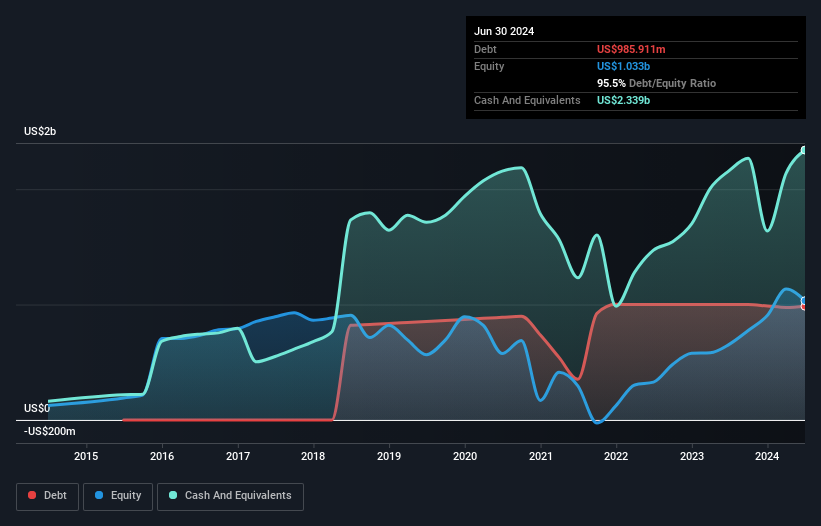- United States
- /
- Software
- /
- NasdaqGS:TEAM
Health Check: How Prudently Does Atlassian (NASDAQ:TEAM) Use Debt?

Some say volatility, rather than debt, is the best way to think about risk as an investor, but Warren Buffett famously said that 'Volatility is far from synonymous with risk.' So it might be obvious that you need to consider debt, when you think about how risky any given stock is, because too much debt can sink a company. We can see that Atlassian Corporation (NASDAQ:TEAM) does use debt in its business. But should shareholders be worried about its use of debt?
When Is Debt Dangerous?
Debt assists a business until the business has trouble paying it off, either with new capital or with free cash flow. If things get really bad, the lenders can take control of the business. While that is not too common, we often do see indebted companies permanently diluting shareholders because lenders force them to raise capital at a distressed price. By replacing dilution, though, debt can be an extremely good tool for businesses that need capital to invest in growth at high rates of return. When we think about a company's use of debt, we first look at cash and debt together.
See our latest analysis for Atlassian
How Much Debt Does Atlassian Carry?
As you can see below, Atlassian had US$985.9m of debt, at June 2024, which is about the same as the year before. You can click the chart for greater detail. But on the other hand it also has US$2.34b in cash, leading to a US$1.35b net cash position.

How Strong Is Atlassian's Balance Sheet?
We can see from the most recent balance sheet that Atlassian had liabilities of US$2.61b falling due within a year, and liabilities of US$1.57b due beyond that. Offsetting this, it had US$2.34b in cash and US$628.0m in receivables that were due within 12 months. So it has liabilities totalling US$1.21b more than its cash and near-term receivables, combined.
Given Atlassian has a humongous market capitalization of US$43.1b, it's hard to believe these liabilities pose much threat. However, we do think it is worth keeping an eye on its balance sheet strength, as it may change over time. While it does have liabilities worth noting, Atlassian also has more cash than debt, so we're pretty confident it can manage its debt safely. The balance sheet is clearly the area to focus on when you are analysing debt. But it is future earnings, more than anything, that will determine Atlassian's ability to maintain a healthy balance sheet going forward. So if you're focused on the future you can check out this free report showing analyst profit forecasts.
In the last year Atlassian wasn't profitable at an EBIT level, but managed to grow its revenue by 23%, to US$4.4b. With any luck the company will be able to grow its way to profitability.
So How Risky Is Atlassian?
Although Atlassian had an earnings before interest and tax (EBIT) loss over the last twelve months, it generated positive free cash flow of US$1.4b. So although it is loss-making, it doesn't seem to have too much near-term balance sheet risk, keeping in mind the net cash. The good news for Atlassian shareholders is that its revenue growth is strong, making it easier to raise capital if need be. But that doesn't change our opinion that the stock is risky. The balance sheet is clearly the area to focus on when you are analysing debt. However, not all investment risk resides within the balance sheet - far from it. Case in point: We've spotted 2 warning signs for Atlassian you should be aware of.
If, after all that, you're more interested in a fast growing company with a rock-solid balance sheet, then check out our list of net cash growth stocks without delay.
New: Manage All Your Stock Portfolios in One Place
We've created the ultimate portfolio companion for stock investors, and it's free.
• Connect an unlimited number of Portfolios and see your total in one currency
• Be alerted to new Warning Signs or Risks via email or mobile
• Track the Fair Value of your stocks
Have feedback on this article? Concerned about the content? Get in touch with us directly. Alternatively, email editorial-team (at) simplywallst.com.
This article by Simply Wall St is general in nature. We provide commentary based on historical data and analyst forecasts only using an unbiased methodology and our articles are not intended to be financial advice. It does not constitute a recommendation to buy or sell any stock, and does not take account of your objectives, or your financial situation. We aim to bring you long-term focused analysis driven by fundamental data. Note that our analysis may not factor in the latest price-sensitive company announcements or qualitative material. Simply Wall St has no position in any stocks mentioned.
About NasdaqGS:TEAM
Atlassian
Through its subsidiaries, designs, develops, licenses, and maintains various software products worldwide.
Flawless balance sheet with high growth potential.
Similar Companies
Market Insights
Community Narratives




